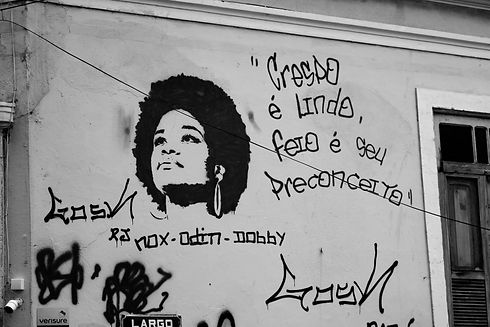top of page

Schedule & Course Readings
Menu
Institute Schedule
The Institute is divided into three different modules that will be spread over twelve sessions for the duration of the three-week program. Virtual instruction will take place from June 13-17. Participants should plan on arriving in San Diego no later than Sunday June 19th for the in person portion of the program which will run from June 20-July 1.
Week One: Historical Background and Racial Politics of Brazil
The first week of the Institute will follow a chronological trajectory, beginning with a brief introduction to colonial history and nineteenth-century racial ideologies, urban divisions, Brazil’s position in the Black Atlantic, the development of a politicized Afro-Brazilian identity, and the growth of urban segregation and divisions. This will allow us to illustrate how race and racism are shaped by historical, geographical, and cultural factors, and to explore how social divisions are embedded in Brazil’s image of an emerging modern power. The discussions will center on readings, as well as analyses of musical and visual examples. Week One includes topics such as “Early Images of Brazil in Global Context: Noble Savages and Indigeneity”; “Brazil and the African Diaspora”; “The Emergence of Modern Brazilian Racial Ideologies”.
Week Two: Modernity and Marginality in Urban and Rural Contexts
The second week of the Institute will take a closer look at the urban vs. rural contrasts that play out in modern Brazil, both historically and in the contemporary context. The focus of this week is to understand how racial and ethnic disparities inform the Brazilian landscape and shape communities that have been historically marginalized. The topics of sessions will include: “Labor, Race and Marginal Urban Spaces”; “Contrasting Images of Urban and Rural Modernisms”; “Indigeneity in Contemporary Times”; “Blackness and Urban Spaces”; “Development, Dams, Stadiums and Modernity”.
Week Three: Cultural Representations of Modern Inequalities
The third week will approach the idea of “failed modernity” from the interdisciplinary perspective of literary, film and cultural studies. In particular, our aim is for participants to make links between the historical, anthropological and social concepts discussed in Weeks One and Two, and the cultural representations of Brazil’s marginal spaces, racial diversity and social inequalities as depicted in fictional texts, film, music, photography and performance. This week’s sessions will discuss the following topics: “Race and the Body”; “Brazilian Carnival”; “Urban Marginal Spaces”; “Musical Intersections of Gender, Race and Class”.
Schedule and Course Readings
During the first week, the workshop will meet virtually. We will then meet in person for the remaining two weeks at San Diego State University. Seminar-style meetings will take place Monday through Thursday from 9-11:30am PT. Fridays will be dedicated to group and individual work, consultation, and project presentation. Participants should anticipate reading several academic articles or book chapters per day in preparation for discussion. There will be a film required each week. In addition to the core readings that will form the basis of the Institute, the project directors will be happy to provide additional bibliographies so that participants can deepen their exploration of a given topic if so desired.
During the afternoons, participants will work on their individual projects, whether curricular- or research-oriented. The project directors will be available to work one-on-one with participants. Two afternoons will offer participants the chance to engage in additional professional development opportunities, with mini-workshops on incorporating the arts into teaching and on developing faculty-led study abroad programs in Brazil. Throughout the workshop, we will also participate in community-based activities, including visits to Brazilian percussion sessions, samba and forro performances, and capoeira classes.
All course readings will be available on the website by May 1st. Prior to the beginning of the seminar, all participants should read Brazil: A Biography by Lilia Schwarcz and Heloisa M. Starling, Farrar, Straus and Giroux, 2018.
Participants’ Project Schedule
The goal of the Institute is for participants to leave having not only greatly expanded their knowledge of Brazil and of the thematic foci of the Institute, but to have also developed one or both of the following:
A detailed course module or syllabus (complete with bibliographies, assigned readings and information about resources) that integrates Brazil in a meaningful way into their teaching.
Or:
An innovative research project. We will provide tools and resources to guide participants to key texts and databases that will enable them to bring Brazil into the scope of their research, as either an integral part or as point of comparison.
Week 1: Participants will determine their curriculum goals and/or individual research projects. Collaborative endeavors are welcome and will be encouraged.
Week 2: Participants will work on their projects with the possibility of honing the materials they have developed within the Institute (i.e. they present initial ideas to the group for feedback).
Week 3: Participants discuss their projects as a group (revised teaching plans, articles or productions), as works-in-progress or as finished products.
Our hope is that each participant will be able to draw from the Institute’s thematic content to enhance a project germane to their field of study, career path, or personal interests.
Participant Expectations
The morning sessions will rely on discussion and we expect participants to be intellectually engaged in the entire Institute. Participants should come to each meeting with a keen curiosity about Brazil and an earnest desire to broaden their understanding of the region and issues under study.
We expect all participants to fully adhere to the NEH Principles of Civility.
Institute Schedule
Course Readings
Project Schedule
Expectation
bottom of page



